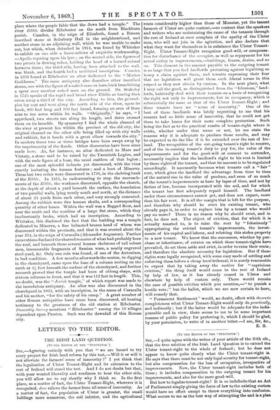[TO THE EDITOR OF THE "SPECTITOR.1 SIR,—I quite agree with
the writer of your article of the 30th ult., that the true solution of the Irish Land Question is to extend the Ulster tenant-right to the whole of Ireland ; but he does not appear to know quite clearly what the Ulster tenant-right is. He says that there must be not only legal security for tenant-right, but also compensation for the loss of occupation, irrespective of improvements. Now, the Ulster tenant-right includes both of these; it includes compensation to the outgoing tenant for his improvements, and also for the mere good-will.
But how to legalize tenant-right? It is so indefinite that an Act of Parliament simply giving the force of law to the existing custom would have no effect except to throw everything into confusion. What occurs to me as the best way of attempting the end is a plan that I stated in a letter that you published on January 5, 1867,— that my tenant-at-will, if evicted for any other reason than failure to fulfil the conditions of his tenure, should have the same action against his landlord which the law now gives him against an evicting railway company.
Your contributor appears to regard with some favour the idea of terminable leases as a satisfactory compromise. In this I think him altogether wrong. Short leases would be refused by the tenants, who do not and never did care for leases of what English or Scotch tenants would think any moderate length, because they think tenancy, nominally and legally at will, but practically involving an undefined right to hold on to the laud, is better than a lease for a certain moderate term, with an implied surrender of any claim on the land at its expiration. Mr. Butt's proposal of a lease of sixty-three years to every agricultural tenant in Ireland, at the present rent, would, very probably, be accepted by the tenants, but it would be with the secret—or rather I ought to say the avowed—expectation that on or before the expiration of that period their grandchildren would extort the concession of the land in perpetuity, by civil war, if no other way should succeed. There is also this objection to leases in Ireland, which alone ought to be conclusive against them for general adoption,—that the last few year of the lease will be employed by many of the tenants in exhausting the land. It would be easy, no doubt, to put covenants in the leases to prohibit this, but nearly impossible to enforce them, because public opinion would be against such enforcement. In Scotland, and I believe in England, the public opinion of the farming class regards a farmer as a public enemy who exhausts laud; but in Ireland that stigma attaches to a landlord who uses strong means to save his land from exhaustion.
It is also to be observed that any legislative measure will be worse than useless, unless it effectually hinders the subletting and subdivision of farms. It was the subdivision of laud that led to the famine. The landlords now prevent it ; but if their control is simply abolished the tenants will divide and sublet again, and the dearly-bought experience of the famine years will have been in































 Previous page
Previous page